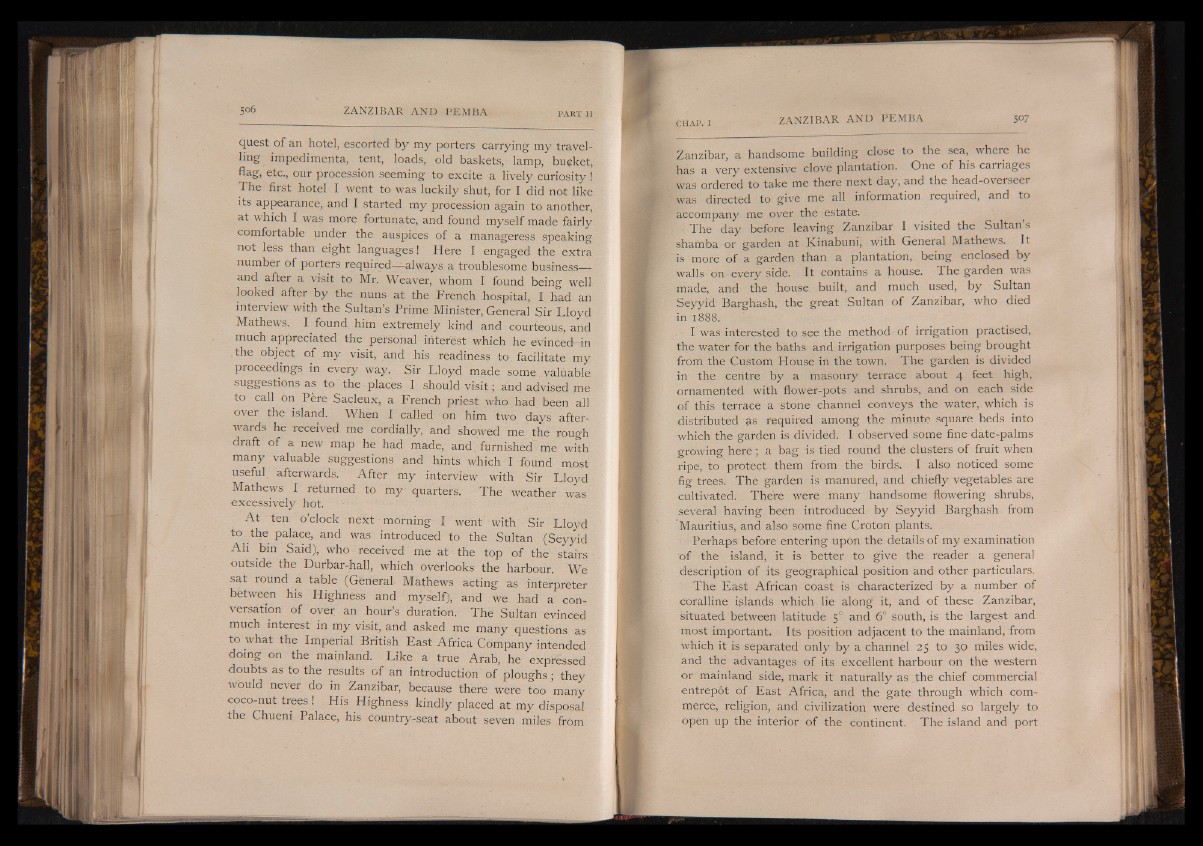
quest of an hotel, escorted by my porters carrying my travelling
impedimenta, tent, loads, old baskets, lamp, bucket,
flag, etc., our procession seeming to excite a lively curiosity !
The first hotel I went to was luckily shut, for I did not like
its appearance, and I started my procession again to another,
at which I was more fortunate, and found myself made fairly
comfortable under the auspices of a manageress speaking
not less than eight languages! Here I engaged the extra
number of porters required-—always a troublesome business—B
and after a visit to Mr. Weaver, whom I found being well
looked after by the nuns at the French hospital, I had an
interview with the Sultan’s Prime Minister, General Sir Lloyd
Mathews. I found him extremely kind and courteous, and
much appreciated the personal interest which he evinced in
the object of my visit, and his readiness to. facilitate my
proceedings in every way. Sir Lloyd made some valuable
suggestions as to the places I should visit; and advised me
to call on Pere Sacleux, a French priest who had been all
over the island. When I called on him two days afterwards
he received me cordially, and showed me the rough
draft of a new map he had made, and, furnished me with
many valuable suggestions and hints which I found most
useful, afterwards. After my interview with Sir Lloyd
Mathews I returned to my quarters. The weather was
excessively hot.
A t ten o’clock next morning I went' with Sir Lloyd
to the palace, and was introduced to the Sultan (Seyyid
Ali bin Said), who received me at the top of the stairs
outside the Durbar-hall, which overlooks the harbour. We
sat round a table (General Mathews acting as interpreter
between his Highness and myself), and we had a conversation
of over an hour’s duration. The Sultan evinced
much interest in my visit, and asked me many questions as
to what the Imperial British East Africa Company intended
doing on the mainland. Like, a true Arab, he expressed
doubts as to the results of an introduction of ploughs; they
would never do in Zanzibar, because there were too many
coco-nut trees ! His Highness kindly placed at my disposal
the Chueni Palace, his country-seat about seven miles from
Zanzibar, a handsome building close to the sea, where he
has a very extensive clove plantation. One of his carriages
was ordered to take me there next day, and the head-overseer
was directed to give me all information required, and to
accompany me over the estate.
The day before leaving Zanzibar I visited the Sultan’s
shamba or garden at Kinabuni, with General Mathews. It
is more of a garden than a plantation, being enclosed by
walls on every side. It contains a house. The garden was
made, and the house built, and much used, by Sultan
Seyyid Barghash, the great Sultan of Zanzibar, who died
in 1888.
I was interested to see the method of irrigation practised,
the water for the baths and irrigation purposes being brought
from the Custom House in the town. The garden is divided
in the centre by a masonry terrace about 4 feet high,
ornamented with flower-pots and shrubs, and on each side
of this terrace a stone channel conveys the water,, which is
distributed as required among the minute square beds into
which the garden is divided. I observed some fine date-palms
growing here ; a bag is tied round the clusters of fruit when
ripe, to protect them from the birds. I also noticed some
fig trees. The garden is manured, and chiefly vegetables are
cultivated. There were many handsome flowering shrubs,
several having been introduced by Seyyid Barghash from
Mauritius, and also some fine Croton plants.
Perhaps before entering upon the details of my examination
of the island, it is better to give the reader a general
description of its geographical position and other particulars.
The East African coast is characterized by a number of
coralline inlands which lie along it, and of these Zanzibar,
situated between latitude 5° and 6° south, is the largest and
most important. Its position adjacent to the mainland, from
which it is separated only by a channel 25 to 30 miles wide,
and the advantages of its excellent harbour on the western
or mainland side, mark it naturally as the chief commercial
entrepôt of East Africa, and the gate through which commerce,
religion, and civilization were destined so largely to
open up the interior of the continent. The island and port